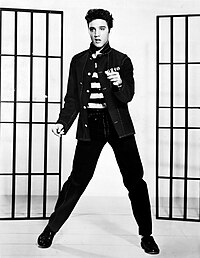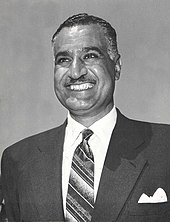Portal:1950s/Selected biography
| This page is currently inactive and is retained for historical reference. Either the page is no longer relevant or consensus on its purpose has become unclear. To revive discussion, seek broader input via a forum such as the village pump. |
| Note: Article entries are now being transcluded directly on the main portal page. However, this page should be retained for historical reference. |
The layout design for these biographies is at Portal:1950s/Selected biography/Layout.
- Add a new Selected biography to the next available subpage.
- Update "max=" to new total for its {{Random portal component}} on the main page and on this page in {{Numbered subpages}}.
Selected biography 1
Portal:1950s/Selected biography/1
Elvis Aaron Presley (January 8, 1935 – August 16, 1977), known mononymously as Elvis, was an American singer and actor. Known as the "King of Rock and Roll", he is regarded as one of the most significant cultural figures of the 20th century. Presley's energized performances and interpretations of songs, and sexually provocative performance style, combined with a singularly potent mix of influences across color lines during a transformative era in race relations, brought both great success and initial controversy.Presley was born in Tupelo, Mississippi; his family relocated to Memphis, Tennessee, when he was 13. His music career began there in 1954, at Sun Records with producer Sam Phillips, who wanted to bring the sound of African-American music to a wider audience. Presley, on guitar and accompanied by lead guitarist Scotty Moore and bassist Bill Black, was a pioneer of rockabilly, an uptempo, backbeat-driven fusion of country music and rhythm and blues. In 1955, drummer D. J. Fontana joined to complete the lineup of Presley's classic quartet and RCA Victor acquired his contract in a deal arranged by Colonel Tom Parker, who managed him for the rest of his career. Presley's first RCA Victor single, "Heartbreak Hotel", was released in January 1956 and became a number-one hit in the US. Within a year, RCA Victor would sell ten million Presley singles. With a series of successful television appearances and chart-topping records, Presley became the leading figure of the newly popular rock and roll; though his performative style and promotion of the then-marginalized sound of African Americans led to him being widely considered a threat to the moral well-being of white American youth. (Full article...)
Selected biography 2
Portal:1950s/Selected biography/2
Born in Grand Chute, Wisconsin, McCarthy commissioned into the Marine Corps in 1942, where he served as an intelligence briefing officer for a dive bomber squadron. Following the end of World War II he attained the rank of major. He volunteered to fly twelve combat missions as a gunner-observer. These missions were generally safe, and after one where he was allowed to shoot as much ammunition as he wanted, mainly at coconut trees, he acquired the nickname "Tail-Gunner Joe". Some of his claims of heroism were later shown to be exaggerated or falsified, leading many of his critics to use "Tail-Gunner Joe" as a term of mockery. (Full article...)
Selected biography 3
Portal:1950s/Selected biography/3
Marilyn Monroe (/ˈmærəlɪn mənˈroʊ/ MARR-ə-lin mən-ROH; born Norma Jeane Mortenson; June 1, 1926 – August 4, 1962) was an American actress and model. Known for playing comic "blonde bombshell" characters, she became one of the most popular sex symbols of the 1950s and early 1960s, as well as an emblem of the era's sexual revolution. She was a top-billed actress for a decade, and her films grossed $200 million (equivalent to $2 billion in 2023) by the time of her death in 1962.Born and raised in Los Angeles County, Monroe spent most of her childhood in a total of twelve foster homes and an orphanage before marrying James Dougherty at age sixteen. She was working in a factory during World War II when she met a photographer from the First Motion Picture Unit and began a successful pin-up modeling career, which led to short-lived film contracts with 20th Century Fox and Columbia Pictures. After a series of minor film roles, she signed a new contract with Fox in late 1950. Over the next two years, she became a popular actress with roles in several comedies, including As Young as You Feel and Monkey Business, and in the dramas Clash by Night and Don't Bother to Knock. Monroe faced a scandal when it was revealed that she had posed for nude photographs prior to becoming a star, but the story did not damage her career and instead resulted in increased interest in her films. (Full article...)
Selected biography 4
Portal:1950s/Selected biography/4
Nikita Sergeyevich Khrushchev (15 April [O.S. 3 April] 1894 – 11 September 1971) was First Secretary of the Communist Party of the Soviet Union from 1953 to 1964, and Chairman of the Council of Ministers (premier) from 1958 to 1964. During his rule, Khrushchev stunned the communist world with his denunciation of his predecessor Joseph Stalin and embarked on a policy of de-Stalinization with his key ally Anastas Mikoyan. He sponsored the early Soviet space program and enacted reforms in domestic policy. After some false starts, and a narrowly avoided nuclear war over Cuba, he conducted successful negotiations with the United States to reduce Cold War tensions. In 1964, the Kremlin circle stripped him of power, replacing him with Leonid Brezhnev as First Secretary and Alexei Kosygin as Premier.On 5 March 1953, Stalin's death triggered a power struggle in which Khrushchev emerged victorious upon consolidating his authority as First Secretary of the party's Central Committee. On 25 February 1956, at the 20th Party Congress, he delivered the "Secret Speech", which denounced Stalin's purges and ushered in a less repressive era in the Soviet Union. His domestic policies, aimed at bettering the lives of ordinary citizens, were often ineffective, especially in agriculture. Hoping eventually to rely on missiles for national defense, Khrushchev ordered major cuts in conventional forces. Despite the cuts, Khrushchev's time in office saw the tensest years of the Cold War, culminating in the Cuban Missile Crisis in 1962. (Full article...)
Selected biography 5
Portal:1950s/Selected biography/5
Gamal Abdel Nasser Hussein (15 January 1918 – 28 September 1970) was an Egyptian military officer and politician who served as the second president of Egypt from 1954 until his death in 1970. Abdel Nasser led the Egyptian revolution of 1952 and introduced far-reaching land reforms the following year. Following a 1954 attempt on his life by a Muslim Brotherhood member, he cracked down on the organization, put President Mohamed Naguib under house arrest and assumed executive office. He was formally elected president in June 1956.Abdel Nasser's popularity in Egypt and the Arab world skyrocketed after his nationalization of the Suez Canal Company and his political victory in the subsequent Suez Crisis, known in Egypt as the Tripartite Aggression. Calls for pan-Arab unity under his leadership increased, culminating with the formation of the United Arab Republic with Syria from 1958 to 1961. In 1962, Abdel Nasser began a series of major socialist measures and modernization reforms in Egypt. Despite setbacks to his pan-Arabist cause, by 1963 Abdel Nasser's supporters gained power in several Arab countries, but he became embroiled in the North Yemen Civil War, and eventually the much larger Arab Cold War. He began his second presidential term in March 1965 after his political opponents were banned from running. Following Egypt's defeat by Israel in the Six-Day War of 1967, Abdel Nasser resigned, but he returned to office after popular demonstrations called for his reinstatement. By 1968, Abdel Nasser had appointed himself prime minister, launched the War of Attrition to regain the Israeli-occupied Sinai Peninsula, begun a process of depoliticizing the military, and issued a set of political liberalization reforms. After the conclusion of the 1970 Arab League summit, Abdel Nasser suffered a heart attack and died. His funeral in Cairo drew five to six million mourners, and prompted an outpouring of grief across the Arab world. (Full article...)
Nominations
Feel free to add FA-Class biography articles and A-Class biography articles of relevant people of the 1950s to the above list. Other 1950s-related biographies may be nominated here.




